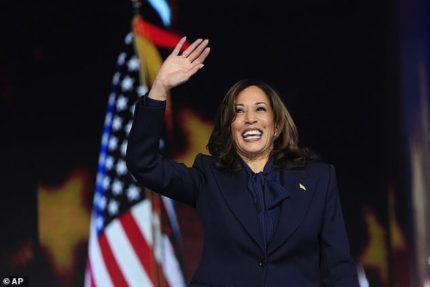Vice President Kamala Harris is showing strong momentum in four critical swing states following the withdrawal of Robert F. Kennedy Jr. from the presidential race. New polls conducted by Beacon Research and Shaw & Company Research for Fox News reveal that Kamala Harris has narrowed the gap against former President Donald Trump in these battlegrounds, with the vice president now leading in three out of four of them. The polls, conducted after the Democratic National Committee’s endorsement of Kamala Harris and Kennedy’s exit, indicate that Harris is ahead of Trump by two percentage points in Georgia and Nevada, and by one percentage point in Arizona. However, she trails by a single percentage point in North Carolina.
These states were initially considered out of reach for the Democratic Party when President Joe Biden was at the top of the ticket. However, with Biden stepping down in favor of Kamala Harris on July 21, the Democratic prospects have significantly improved. Harris’s campaign has successfully revitalized these crucial battlegrounds, making them winnable for the Democrats, according to the recent poll findings. The shift in momentum underscores Harris’s ability to expand the electoral map beyond the traditional blue wall states that were pivotal in the previous election cycles.
Kamala Harris’s Impact on the Electoral Map
The latest polling data reflects Kamala Harris’s ability to reshape the electoral map, which appeared unfavorable for the Democrats under Biden’s leadership. Pollster Chris Anderson, in his analysis for Fox News, highlighted the dramatic change in the Democrats’ electoral strategy. “These results show Kamala Harris has succeeded at expanding the electoral map,” Anderson noted. “When Biden was at the top of the ticket, the only pathway to an electoral college victory for the Democrat ticket was a sweep of the blue wall states of Michigan, Wisconsin, and Pennsylvania. That’s no longer the case with these Sun Belt states in play.”
Harris’s rise in the polls suggests a broader appeal that extends beyond the traditionally Democratic-leaning states. Michigan and Wisconsin, which were once considered vulnerable, now seem secure for Harris. However, Pennsylvania remains a toss-up, adding pressure on the Democrats to solidify their standing in states like Arizona and Georgia, which have become more competitive under Harris’s candidacy. The shift towards the Sun Belt is a significant development, offering the Democrats additional pathways to secure the necessary electoral votes.
Democratic Support Surges Among Key Demographics
One of the most notable aspects of Harris’s recent surge is the increase in support among key demographic groups that had shown signs of waning enthusiasm for Biden. The Beacon/Shaw poll highlights how Harris has managed to galvanize support among Black and Hispanic voters, demographics that are crucial for a Democratic victory. Under Biden, there was a noticeable decline in enthusiasm among these groups, but Harris appears to have reversed this trend.
In addition to boosting support among minority voters, Kamala Harris has also made gains with younger voters and Americans over 65, two groups that are often challenging to simultaneously appeal to. This broad-based support is critical as Harris seeks to build a coalition that can carry her to victory in the 2024 presidential election. The poll results demonstrate Harris’s potential to unite diverse voter bases, a key factor in her recent success in the swing states. As the election draws nearer, her ability to maintain and expand this support will be crucial in determining the outcome.
The Impact of RFK Jr.’s Exit and Harris’s Appeal
The recent polling data comes on the heels of Robert F. Kennedy Jr.’s (RFK Jr.) departure from the presidential race and his endorsement of Donald Trump. This development has introduced a new dynamic into the race, as RFK Jr. had garnered significant support among voters who were skeptical of the traditional Democratic and Republican candidates. The poll reveals that three-quarters of voters who viewed RFK Jr. favorably are now backing Trump, highlighting a potential shift in the electorate that could benefit the former president.
However, the full impact of RFK Jr.’s exit is still unclear, as the race continues to evolve. Vice President Kamala Harris has shown notable improvements in her support base, particularly among key demographic groups. Harris’s support among Black voters has risen to 79%, a significant boost from Biden’s previous numbers. Additionally, she has garnered 56% support from Hispanic voters, 55% from those under 30, and 51% among voters aged 65 and over. Women prefer Harris over Trump by an 11% margin, while men favor Trump by the same margin. Independents, a crucial voting bloc, lean towards Harris by six percentage points, signaling her growing appeal across diverse segments of the electorate.
Voters’ Top Concerns and Harris’s Challenges
The latest polls also provide insights into the issues that voters prioritize in this election cycle. The economy tops the list, with 41% of voters identifying it as their primary concern, followed by immigration at 14% and abortion at 13%. Arizona stands out as an outlier, with only 37% of voters ranking the economy as their top issue, while immigration and abortion each garnered 16% of the vote. Healthcare and “election integrity” were distant fourth and fifth concerns, with voters in these states showing a slight preference for Harris on these issues.
Despite Kamala Harris’s gains in various demographics, Trump continues to lead in critical areas such as economic management, where he is favored by 53% of voters compared to Harris’s 45%. Trump’s advantage is even more pronounced on immigration, with 57% of voters trusting him over Harris, who has the support of 41% on this issue. Harris does, however, have an edge on the issue of abortion, but she trails Trump on handling international crises, such as the Israeli invasion of Gaza, where she is down 44% to 52%.
The question now is whether Harris can maintain and build on her improving poll numbers in the wake of the Democratic National Convention. Political analyst Anderson notes that campaigns often experience a temporary bump in poll numbers following their conventions, but this boost typically fades within a month. However, Anderson also points out that this is not a traditional campaign, and Kamala Harris’s post-convention momentum could persist. As the race unfolds, Harris’s ability to capitalize on this momentum will be critical to her chances of securing the presidency.














